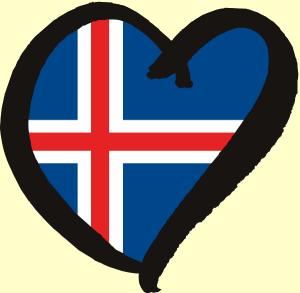
A survey was carried out by Monitor on behalf of main Icelandic daily Morgunblaðið, where readers were asked to select their favourite Icelandic entry of all time. Approximately 2.000 people took part, which, contrary to what you may think, is actually quite remarkable for a country of this size!
Since their debut in 1986, Icelanders have thrown themselves wholeheartedly into the competition and, year after year, compete with renewed vigour despite overwhelmingly disappointing results in most years. On the eve of their very first participation, the streets of Reykjavík were reportedly deserted, as everyone stayed at home to watch Icy fly the flag for the fledgling Eurovision nation. Similarly, the pride and joy felt by Icelanders in 1999 was tremendous when Selma brought home a silver medal for her country with the second placed All Out Of Luck in 1999. The feat was repeated exactly 10 years later by the charming young singer Jóhanna Guðrún Jónsdóttir (Yohanna) in Moscow. The actual winner of the Icelandic poll, although no surprise to any Icelander, will guaranteed raise many an eyebrow throughout Europe. The result of the survey was as follows:
1. Draumur um Nínu (1991)
Artist: Eyjólfur Kristjánsson and Stefán Hilmarsson (Stefán & Eyfi)
Percentage of total vote: 24,27%
2. Is It True? (2009)
Artist: Jóhanna Guðrún Jónsdóttir
Percentage of total vote: 22,71%
3. All Out Of Luck (1999)
Artist: Selma Björnsdóttir
Percentage of total vote: 13,94%
4. This Is My Life (2008)
Artist: Eurobandið
Percentage of total vote: 5,4%
5. Gleðibankinn (1986)
Artist: Icy
Percentage of total vote: 4,94%
Nína or Draumur um Nínu (A Dream about Nina) as it is better known in Iceland has become something of an evergreen since it represented the country in Rome nearly 20 years ago, and still remains one of the most widely played songs of the island nation. When told of the result, Eyjólfur Kristjánsson (Eyfi) remarked "I am extremely moved with this result, it’s a great honour for me personally to figure on this list among such talented musicians. That Nína would stand out from so many brilliant entries is indeed some recognition". Eyjólfur goes on to explain that "I never tire of the song, because I wrote both the lyrics and music and because Nína has played such a major part in the success I’ve enjoyed in my music career. However, I can’t say that I listen to it that often at home", he quipped.
http://www.youtube.com/watch?v=UWnK_7WeEXQ
http://www.youtube.com/watch?v=L-NE0yJsA2g
In my view
So, how else can the remaining postitions be explained? It is hardly surprising that Is It True came in second with almost a quarter of the votes, given that Yohanna reached a very respectable 2nd place only last year, her achievement still fresh in the minds of many an Icelandic fan. Selma also gave Iceland their only other second placing back in 1999, which also presumably explains her 14% of the vote.
Eurobandið made the top 5, not just because of their electric live performance and infectiously catchy entry. but also possibly for psychological reasons. They managed to bring Iceland back to a Eurovision final for the first time in 4 years, following Jónsi’s undeservedly mediocre result in 2004. The fact that Regina Ósk and Friðrik Ómar are extremely popular, helps of course. I would attribute Icy’s fifth place in the survey purely down to affectionate reasons, as they were the first artists to represent Iceland in the Eurovision Song Contest and participation was a source of national pride.
The opinion expressed in "In my view" are those of the author and are not necessarily the one of EuroVisionary.com.


















